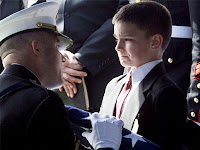It was a spring day fifty years ago. I was ten years old when our family –
mom, dad and four of us (of which I was the oldest) loaded up the Ford station
wagon and drove from our home in rural Onslow County, NC to Rocky Mount. Of the six who took the trip five would
make the drive back home.
Previous family trips never had us stop in Rocky Mount. We would always pass through on US Hwy
301. Interstate 95 wasn’t yet
built. But Rocky Mount was never a
destination for us, since our reason for heading that northerly direction was
to go farther north to the Washington, D.C. area to visit grandparents, aunts,
uncles and cousins. This trip was
different.
My memory doesn’t include some of the details. I can’t recall if we were talkative or
if we fought over our space in the back seat. Most likely we did.
And maybe that was a good distraction for my parents. Nor do I remember how long the trip
lasted, although I know we were back home in the afternoon. My guess is that I got to ride up front
beside mom on the return trip, but I don’t remember her words or emotions.
But it had to be emotional for her. We had taken Dad to the train depot in
Rocky Mount, where he boarded a train.
Somewhere, I guess, he boarded a plane. But he then spent a month in southern California training
for survival. When that month was
up he got on another plane and wound up in southeast Asia – South Viet Nam –
where he would spend the bulk, other than R(est) and R(elaxation) of the next
twelve months.
Dad is eighty years old now, but still very much a
Marine. He was just about to turn
thirty when he deployed. A father
of 4 with one on the way. Yet I
don’t remember ever any regrets being expressed in my hearing, either before
his time there or after. Not a
word.
During those 13 months in absentia Dad missed some big events at home. My first Little League season. He wasn’t there to play catch or coach
like he would in subsequent years.
My spiritual birth and then my baptism took place while he was gone. I
joined the Scouts and went on my first camping trips without him. He got word via the Red Cross that his
number 5 child was born that fall.
And I’m sure that there were other big happenings Dad missed
out on in that year. Honestly,
everything he missed out on was a big deal to him. And somehow my mother played the role of both parents those
13 months. Four of us were in
school. A baby at home. Yet, we never missed church. I never missed a game or a Scout
meeting. I just missed having my
dad at home.
Am I resentful of that? No way! I knew
from my earliest remembrances that my dad was a Marine (and I was and am proud of his service)
– that he had chosen this career that would take him from us not once, but
twice for a year at a time in my childhood. Mostly I have no regrets because at least my dad came home.
Monday is another Memorial Day, and with each one I
remember my dad’s service, not because Memorial Day celebrates him. It does not. I think of Dad because of the stories he has told me of his
Marine buddies who did not come home.
I see the tears well up in his eyes as he speaks of seeing “the bodies
of Marines stacked up like cord wood”.
Fifty years ago I learned in a very personal way that
freedom is not free. I went to
school with other Marine’s kids whose dads came home in flag-draped
caskets. It is for those Marines,
sailors, soldiers, airmen and coasties – the ones who made the sacrifice of
their own lives that others could be free – that we celebrated Monday.
It might be easy to complain about the weather on Monday “ruining” our holiday. But there would be no holiday had hundreds of thousands in our country’s history not laid down their lives so we could be free to celebrate.
I'm well aware that the little boy in the picture could have been me.





